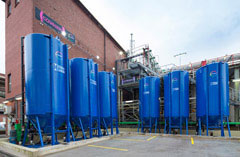Covestro testing recycling wastewater for PC production

Materials manufacturer Covestro is testing an innovative process for recycling saline process wastewater at its polycarbonate production plant. A pilot plant for the process at the Krefeld-Uerdingen site in Germany was opened recently by Federal Minister for the Environment, Dr. Barbara Hendricks. The new technology reduces the salt levels in waters such as the Rhine and conserves potable water resources.
The German Federal Ministry for the Environment has provided some EUR740,000 in funding to support the project as an example of how a closed-cycle approach can be put into practice in industry. The total cost of investment is around EUR3.7 million.
The current project at Covestro marks the first time in Germany that saline industrial wastewater has been recycled at an industrial pilot plant. Pretreated salt water such as this is usually released into waterways, specifically the Rhine, which runs directly along the site. Thanks to the new plant, some of this wastewater can now be used in an electrolysis process to manufacture chlorine. Chlorine itself is one of the key raw materials for producing polycarbonate and other plastics.
The new process helps save up to 30,000 tonnes of salt and 400,000 tonnes of fully desalinated water in chlor-alkali electrolysis every year. That corresponds to the avoidance of emissions totaling 6,200 tonnes of CO2 equivalents annually. Every hour, the process stops up to 70 cu. m of saline wastewater from being released into the Rhine, thereby protecting a similar quantity of potable water resources.
Covestro has already optimised chlor-alkali electrolysis by using energy-saving processes. For example, the oxygen depolarised cathode technology jointly developed by the company helps reduce energy consumption by a further 30% compared to the standard process. If all chlorine producers in Germany were to employ this market-ready process, the country’s total electricity consumption would be reduced by 1%. That roughly corresponds to the annual energy consumption of a large city such as Cologne.
Polycarbonate production has a long history at the Krefeld-Uerdingen site, where Covestro employs approximately 1,100 people. Chemist Dr. Hermann Schnell discovered the polycarbonate Makrolon there in 1953. Industrial production of the material began five years later, and Covestro continues to market it globally today.
(PRA)Copyright (c) 2016 www.plasticsandrubberasia.com. All rights reserved.






































